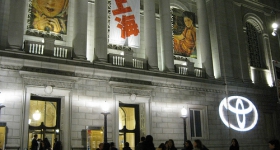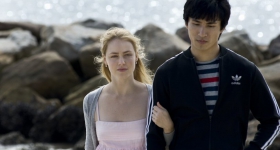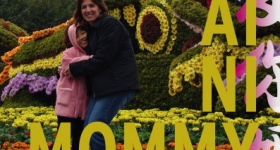Hou Hsiao Hsien is undeniably an iconic figure amongst contemporary filmmakers: a legendary auteur who, for over three decades, has created timeless cinematic classics such as the Golden Lion-winning A City of Sadness (1989), The Cannes Jury-prize winning film The Puppetmaster (1993), Good Men, Good Women (1995) (which won "Best Feature Film" at the 1995 Hawaii International Film Festival), and the Cannes Technical Grand Prize winning Millenium Mambo (2001), among others. He has also brought the Taiwanese New Wave film movement to the very forefront of World Cinema, and was recently honored with a "Best Director" award at the 2015 Cannes Film Festival for his most recent film, The Assassin (2015), which is Taiwan's official entry to the 2016 Academy Awards and stars Taiwanese actors Shu Qi and Chang Chen as characters in a Tang-dynasty period martial arts drama. The film is outstanding, and plays like a shifting painting of breathtaking scenes and gorgeous cinematography, yet still features excellent, dynamic performances from the main stars. An ode to a beloved genre, The Assassin is Director Hou filtering his idea of a wuxia film through his own characteristic elliptical style to create a realistic period piece brimming with long takes and picturesque frames. The resulting experience is pure cinematic poetry. Mr. Hou will also be in attendance at various Q&As in Laemmle theaters across the Los Angeles area: at the Ahrya Fine Arts Movie Theater in Beverly Hills on Friday, October 16th after the 7 PM show and Saturday, October 17th after the 4:20 PM show and at the Playhouse 7 in Pasadena on Saturday, October 17th after the 7:10 PM show. Timothy Tau had the chance to sit down with Director Hou in a recent roundtable interview, which was translated by Eugene Suen.
Can you describe your direction of both professional and non-professional actors in this film, and maybe your usual approach to directing performers?
Regardless of the type of actors I work with, be they professional or non-professional, I work with them the same way. There's no real difference in the way I work. I don't do rehearsals. I don't rehearse or practice with the actors in advance. I basically just give them the situation, give them the context of what they are doing, and let them enter into the world of the film. Oftentimes, they are able to figure out exactly what they are supposed to do, and we move on. So once you have the camera ready and the lights set up and everything is ready to go, the actors simply work in front of the camera. In terms of non-professional actors, they mainly played servants. Many of them came from the theater/stage world or were even classmates of our crew members. Even though there were many different type of people working as actors on the film, I treated them all the same way.
You famously don't like to rehearse with your actors before you shoot, but this is a wuxia film, so there is a lot of fight choreography, etc. Was this a break from your normal workflow? Or did you approach those in your own unique way?
There was not really a disruption to my normal work flow because the action choreographer that I worked with was not an actual action choreographer, yet. He was working previously as the main assistant to a famous Hong Kong action director. He basically had a group of young stunt performers that worked under him, so they would figure out the choreography moves on set with the actors. And for the two main actors who did action scenes -- Shu Qi and Zhou Yun -- they were professional actors and not professionally trained fighters or martial artists, so we would do everything in bits and pieces: we would practice and then shoot parts of the movie and break everything up e.g. shoot some movements here, stop, practice for a time and then come back and shoot the next part, breaking things up into pieces in that fashion. So it wasn't possible to do things all in one day, and we had to work over longer periods of time.

Could you speak on how you recreated the time period (the Tang Dynasty)? Did you try to recreate it as accurate as possible, or just try to give audiences an impression of the era?
Ultimately, I feel its impossible to be exactly precise on recreating the period because time changes and we really don't know what the era really looked like. Like I've said before, I really wish I had a time machine; it'd be great to have a time machine to go back to the Tang Dynasty and spend a few days to know exactly what everything looks like, but that's not possible. Nonetheless, there were still a lot of excellent scholarly materials that we were able to consult. For example, there is a comprehensive historical reference book that has all the details of the politics and culture of Ancient China that was a major source of information. Also, the Old Book of Tang and the New Book of Tang proved useful as well. So we consulted these books for things like costumes, or even the way the furniture would be used (the baths, the benches and chairs and so on) - there was just a lot of material out there. The one striking thing that we ended up employing in the film was the use of silk, with the curtains, etc. Silk was a widely used material in the Tang dynasty. In fact, there was even an article I read about silk worm farmers that were responsible for manufacturing silk during that time. So all this information was out there, and it was not difficult to compile relevant research. We basically looked at the script, figured out what we would need, and then did the necessary research.

In Three Times, Shu Qi and Chang Chen play lovers throughout time, in this film, they seem to be enemies of each other. How did you achieve this and what was the process of working with them like?
I didn't do anything (laughing). I didn't rehearse. They read the script and figured out most of it on their own. However, I had them read relevant literature, short stories, and vignettes about that era, such as wuxia novels. I also had them read Japanese literature about similar genres. The interesting thing was that they never had any questions for me. They just read the materials and showed up on set, and we would just figure stuff out, right there on set, and that was our process.
Much of the cinematography was very impressive, and some of the transitions from B&W to color being reminiscent of your past film Good Men, Good Women. It seemed that the film was shot on 35mm or digital, which lends a very true realism to the film, almost as if you were really there seeing the real history of the period unfold. Where do you fall on the whole digital vs. film divide?
I shot the film on 35mm and then scanned and transferred it digitally. In terms of how I personally feel about it, I am contemplating shooting on digital for my next film. However, digital is not something I am entirely comfortable with, because if I were to shoot on digital I would need to test it out and give it a try. On this particular film, we shot over 440,000 feet of film. The actual average feature film takes up only around 10,000 feet. So we basically shot over 40 times that amount. Nowadays, film is getting more expensive, so it is something that is slowly disappearing. Thus, in a way, its inevitable that we should all eventually work using the digital medium. Nonetheless, I'm still a person that prefers film, I still like the way film looks, and I feel that if we were to shoot and process The Assassin on 35mm film, there would be even more layers to the overall appearance, and it would look even nicer.
In relation to the previous question or anything else, what do you see as the future of cinema?
I feel that cinema is really changing and evolving, especially in terms of exhibition. Obviously we still have theaters, but we all know that the Internet has taken over the way a lot of people consume content. Audiences now watch movies over the Internet. I feel what might happen as a result of this is that the language of visual expression might change, because people are now looking at images on different types of screens, and there could be very interesting possibilities because now filmmakers can mess around with visual expression or visual communication. For example, a frame can be widened, shortened, or the size of the frame can be changed as the filmmaker pleases -- there is a lot of freedom and flexibility with that. Take for example manga or comic books, where there are different frames or shots -- even in a random action sequence e.g., some frames are bigger, some frames are close-ups, some frames are thin or wide -- they come in all shapes, so it is possible for cinematic language to eventually evolve into that. Therefore, I feel that there are a lot of possibilities, a lot of things we can do that can be very interesting.

Many of in the States are fans of you due to your distinct cinematic style. This may be categorized under the genre "Art House", a label sometimes given to films that may not be as accessible. What is your interpretation of the "Art House" genre?
For me, art house films are personal filmmaking or personal films. And what I mean by that is they don't go through conventional accessible channels to audiences, they go through more personal channels of expression. Also, the author or "auteur" of this type of film, they are able to figure out their own artistic combinations, their own formulas: they are able to figure out exactly what they want to express and the proper way to express these things. So going back to what I was saying about digital cinema, I feel that the possibilities afforded by the digital medium can increase the demand for personal filmmaking because filmmakers are given more freedom to play around with the visual language. We are no longer limited to just a theatrical screen.
What are your thoughts on how filmmakers will be making films in the future?
I feel the eventual digitalization of film, or the direction of moving to digital is inevitable. It will happen no matter what. So it is good that cinematic output generally will be less formulaic, and filmmakers, again, can experiment with things like the frame, or innovate with visual language. There are all kinds of freedom that come with the movement to digital. Thus, its interesting that now filmmakers are releasing content on a digital medium and are doing it on a provisional basis, whereas in traditional theatrical formats, you have to go to a theater -- a communal experience that is done with a group of people. However, the media-viewing process is becoming increasingly individualized, so that you are consuming content on your own, or even on your phone. And that can be interesting, because film consumption becomes similar to something like consuming novels, where groups will emerge comprising certain people that read certain kinds of novels. As a result, a sort of a tribal mentality develops, where groups can form around different genres and so on and so forth. This tribal mentality can also breed different types of people, which will be interesting to observe.
There is also the question of the depth and the quality of content that comes about from digital expression. My thoughts are that there might be stories that can be deep and there are also stories that can be sort of average. Its really hard to say what type of content will emerge. But: I also see traditional theatrical exhibition becoming more extreme and more aggressive in attracting viewers, because movie theaters will want to ensure the act of "movie watching" is a communal experience. So its perfectly possible that watching movies in theaters could become more expensive, with fancier, more technologically-advanced features and add-ons, basically anything to make the filmgoing experience so unique that you are compelled to watch movies in theaters. So the experience will be heightened, and that is a possibility that may very well happen with theatrical distribution eventually as well.
Do you have the interest in doing another wuxia film or a film in another genre such as sci-fi?
I can see myself doing another wuxia film. I think a sci-fi film may be too complicated to pull off, but I am open to that possibility.










Comments